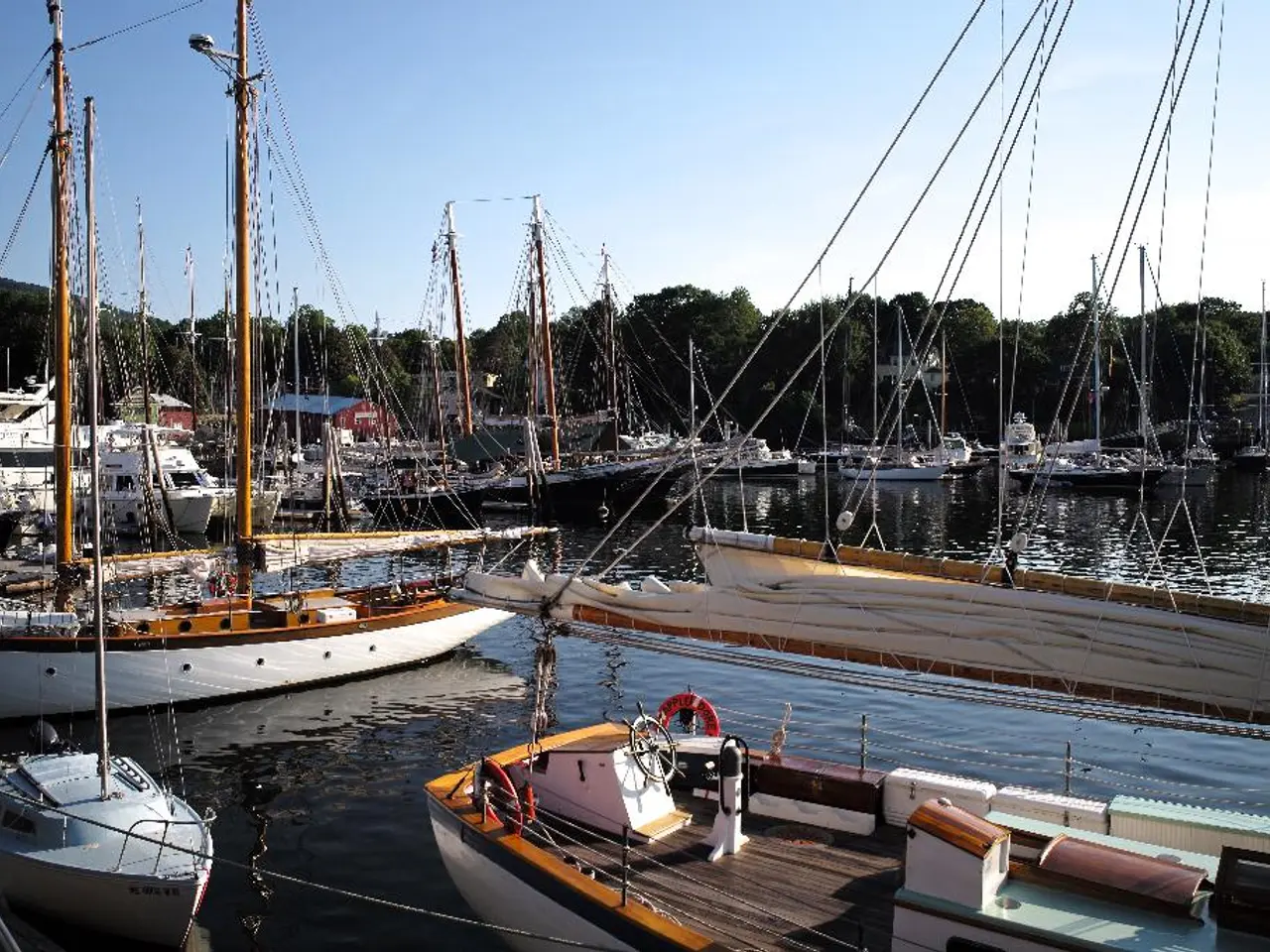Electric tour boat, propelled by batteries from Contemporary Amperex Technology Co. Limited (CATL), begins operation in China
In a significant stride towards sustainable maritime travel, China's first pure electric tourist passenger ship, the Yujian 77, has entered service in Xiamen Bay. This vessel is a testament to the feasibility of pure electric technology in near-shore waters, thanks to the innovative marine battery system provided by Contemporary Amperex Technology Co. Limited (CATL).
The Yujian 77, measuring 49 meters long and 14.5 meters wide, can carry 358 passengers at speeds up to 20 kilometers per hour. Powered by a 3,918 kWh battery pack, the ship offers a range of about 100 km, providing a zero-emission, low-noise, and high-quality maritime travel experience.
CATL's marine battery system boasts cutting-edge innovations such as Cell To Pack (CTP) technology for high energy density (over 140 Wh/kg), integrated Combined Charging System (CCS) for high-voltage charging, and No Propagation (NP) safety tech to prevent thermal runaway at the cell level. These features ensure the system's suitability for harsh marine environments, as evidenced by its IP68 water and dust resistance rating and its ability to withstand prolonged salt spray corrosion.
The Yujian 77 has earned certifications from major global marine classification societies including Bureau Veritas (BV), American Bureau of Shipping (ABS), and Det Norske Veritas (DNV), further validating its robustness and safety.
Beyond the Yujian 77, CATL's marine battery system is also applied in hybrid hydrogen-electric tugboats, demonstrating its versatility in electric vessels. In China, CATL's power battery installations in June reached 25.41 GWh, holding a 43.67 percent market share.
Looking ahead, CATL is extending its battery technology to other electric mobility sectors, including aircraft. In June 2024, the company successfully test-flied a 4-ton civil electric aircraft, with plans to release an 8-ton civil electric aircraft between 2027 and 2028. This trajectory suggests future marine applications may integrate even more advanced energy storage and hybrid systems.
The reduction in emissions from the Yujian 77 is equivalent to the carbon sequestration capacity of planting over 20,000 trees, making it a significant step towards greener shipping. The operation of the Yujian 77 is expected to reduce fuel consumption by nearly 250 tons annually, further emphasising its environmental benefits.
CATL, the world's largest manufacturer of power batteries, with a global market share of 38.1 percent in January-May, continues to lead the way in sustainable technology. With the success of the Yujian 77, it is clear that CATL's marine battery systems are enabling large-scale electric and hybrid vessels, supporting fuel savings and emissions reductions in maritime transport. Their ongoing development indicates expanding influence in green shipping and beyond.
[1] Xinhua News Agency. (2023, June 1). CATL's marine battery system powers China's first pure electric tourist ship. Retrieved from https://www.xinhuanet.com/english/2023-06/01/c_136981002.htm [2] CATL. (2023, April 20). CATL unveils Condensed Battery at Shanghai auto show. Retrieved from https://www.catl.com/en/news/catl-unveils-condensed-battery-at-shanghai-auto-show [3] CATL. (2023, June 2). CATL and CSSC jointly develop China's first hydrogen-electric tugboat. Retrieved from https://www.catl.com/en/news/catl-and-cssc-jointly-develop-chinas-first-hydrogen-electric-tugboat
- CATL's innovative marine battery system, with technologies such as Cell To Pack, Combined Charging System, and No Propagation, is not only powering China's first pure electric tourist ship, but also finding applications in hybrid hydrogen-electric tugboats, showcasing its versatility in the field of environmental-science and technology.
- As CATL extends its battery technology to other electric mobility sectors, including aircraft, and achieves significant milestones, like the test-flight of a 4-ton civil electric aircraft, it becomes evident that their influence extends beyond maritime transport, impacting the finance and business sector with its dominance in the global power battery market.




